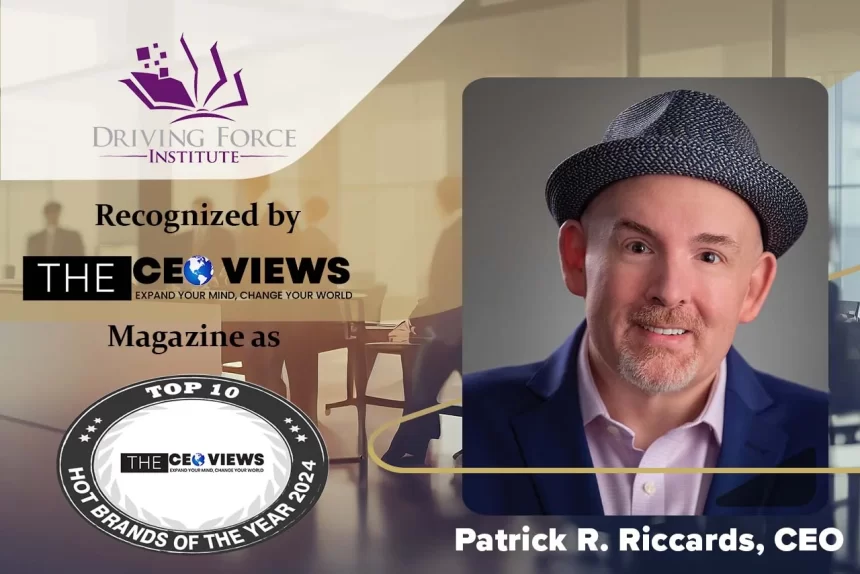Hidden beneath the surface of American education lies a significant crisis in historical understanding, which unfortunately went unnoticed by many. The Driving Force Institute (DFI) emerged from this complex web of challenges, driven by the vision and determination of Patrick Riccards, Founder and CEO.
Years of dedicated service in the education policy domain at the Woodrow Wilson Foundation revealed a troubling reality in American history education—a reality marked by a lack of relevance and effectiveness. National polls confirmed the seriousness of the situation, highlighting a widespread deficiency in historical knowledge, especially among the younger generation.
Despite facing institutional inertia and indifference, Patrick Riccards seized the opportunity to bring about independent change, giving birth to the Driving Force Institute (DFI) as a beacon of hope in the field of education. Against the backdrop of societal apathy, DFI embarked on a mission to redefine the teaching and learning of American history, paving the way for enlightenment and unity.
The Journey So Far
DFI has faced unexpected obstacles and shown impressive flexibility throughout its journey. Since its beginning, the institute has changed and now focuses on short films as a key part of its education. The COVID-19 pandemic emphasized the significance of online content and open educational resources (OER). Additionally, despite debates about the history curriculum, DFI continued to thrive by collaborating with respected organizations such as Makematic, NY Historical Society, the White House Historical Association, and the Smithsonian to navigate challenging times.
Initiatives Driving Transformation
DFI’s efforts demonstrate a dedication to innovation and inclusiveness. Understanding the widespread appeal of online videos, DFI has created short films that are engaging for today’s digital-savvy generation. These films shed light on lesser-known aspects of American history, giving a voice to diverse narratives that are often over-looked in traditional textbooks. With the launch of its ‘Essentials’ project, DFI aims to release 500 new short films by 2026, further emphasizing its commitment to promoting historical knowledge worldwide.
Overcoming Challenges
Challenging the common view of history as boring and irrelevant was a big challenge said Patrick Riccards. DFI’s approach was thoughtful and diverse, focusing on voices that are often ignored and stories that are not usually told to show how history is important. By highlighting the achievements of women and people of color, DFI changed the story, questioning old prejudices and involving a fresh group of students.
Becoming a Leader in History Education
DFI’s rise to the top showcases its ability to adapt and plan ahead. By trying new things and teaming up with others, the institute became known for making top-notch American history films. Focusing on diversity and accuracy, DFI’s movies have been praised by many and seen by millions globally.
Focusing on diversity and accuracy, DFI’s movies have been praised by many and seen by millions globally.
Fostering a Culture of Excellence
At the heart of DFI’s success lies a culture of collaboration and empowerment. Every team member contributes to the creative process, ensuring a multiplicity of perspectives enriches each project. With a coaching leadership style at its helm, DFI cultivates an environment where innovation thrives and collective achievement is celebrated.
Setting Standards for Quality
In a time filled with historical revisionism, DFI stays true to its dedication to honesty and genuineness. Every step of the filmmaking process is carefully regulated to guarantee historical precision and educational effectiveness. Through maintaining strict criteria, DFI’s ‘Untold History’ movies showcase exceptional historical education.
Nurturing Creativity and Relevance
DFI’s ability to bring history to life and make it relevant is crucial to its success. By embracing the rich tapestry of American experiences, the institute encourages curiosity and critical thinking. DFI empowers learners to approach history with the mindset of a historian, sparking an ongoing pursuit of knowledge and ensuring that history stays alive and meaningful.
Charting the Course Ahead
As DFI plans for the future, it focuses on short-term objectives and long-term dreams. By recognizing pioneers in history education with the Walter W. Buckley Jr. Prize and introducing the ‘Essentials’ series, the institute is committed to shedding light on the past for future generations. With dedication and optimism, DFI is paving the way for a more knowledgeable and enlightened future through each short film.
Exploring the Varied Career and Literary Endeavors of Patrick Riccards
Patrick held the position of chief communications and strategy officer at Woodrow before launching DFI. He contributed to the development of initiatives such as the WW Graduate School of Teaching and Learning and the WW Higher Education Policy Fellowship. Patrick also has a background as the CEO of the Connecticut Coalition for Achievement Now, executive director at the American Institutes for Research, a university vice president, and CEO and chief strategist for Exemplar Strategic Communications. He began his career working on Capitol Hill. Currently, Patrick is a member of the Board of Directors for the Center for the Collaborative Classroom and the advisory board for the Education Writers Association. Patrick is the author of two award-winning books – Dadprovement and Dad in a Cheer Bow. He is also the editor of Why Kids Can’t Read: Continuing to Challenge the Status Quo in Education and the recently published, Why History Matters: American History Educators Speak Out, a volume of essays from award-winning social studies teachers on the importance of learning U.S. history.
“We are transforming how American history is taught and learned by exploring untold narratives, bringing inclusive history to students and classrooms, and resonating with teenage audiences.”










